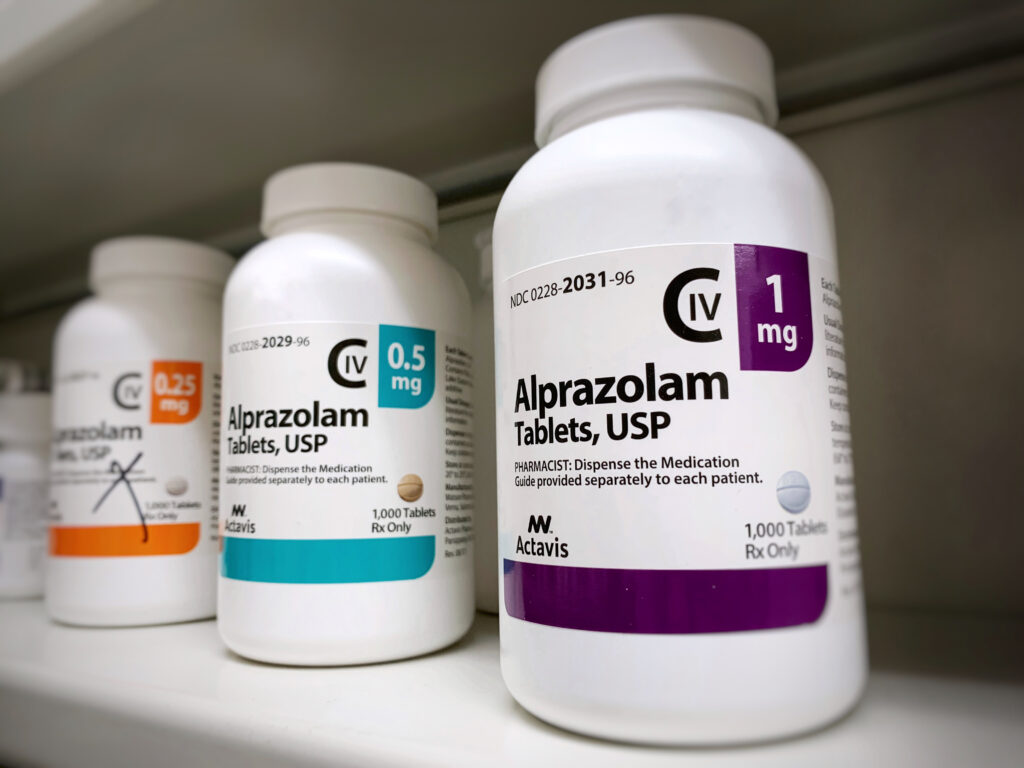Xanax is the brand name for the drug alprazolam. Many people are familiar with Xanax and its calming effects. In medical and mental health settings, Xanax is widely prescribed. Some studies suggest medical and mental health providers wrote more than 17 million prescriptions for Xanax in 2019 alone. Unfortunately, despite its benefits, Xanax is risky because it also carries a high risk for addiction. Recovering from Xanax addiction requires a comprehensive treatment plan, including detox and addiction therapy.
What is Xanax?
Xanax belongs to a class of drugs called benzodiazepines. Benzodiazepines or benzos are depressant drugs prescribed by medical and mental health providers to help manage symptoms related to specific conditions. When someone takes Xanax, it affects particular parts of the brain leading to sensations of calming and relaxation.
You may hear Xanax referred to by other names, especially when Xanax is sold on the street. Common alternate names for Xanax include benzos, blue footballs, Ladders, bars, sticks, or downers. The term benzos is a widely used street slang often applied to Xanax and other drugs belonging to the same drug class.
How is Xanax Used?
Xanax is a highly effective component of a treatment plan for several medical and mental health conditions when used as directed. It effectively reduces the intensity and severity of symptoms linked to several conditions like chronic pain disorders and anxiety. Xanax helps you to feel more relaxed by stimulating the brain to reduce specific chemicals responsible for slowing down the speed of nerve cell activity. Unfortunately, tolerance to the drug’s effects often occurs quickly, leading to complex and challenging side effects, including dependency and addiction.
Is Xanax Addictive?
Xanax or Alprazolam is statistically the most widely prescribed psychiatric drug in the United States. The rate of annual prescriptions written by medical providers coupled with forged prescriptions or doctor shopping leads to a growing amount of Xanax available for purchase outside of legal means. When used long-term (even as prescribed), Xanax is highly addictive. Because tolerance for Xanax develops quickly, it is not uncommon for people who use Xanax (even as part of a prescribed treatment plan) to begin abusing the drug.
Xanax abuse occurs when someone no longer feels the effects of Xanax when taking the prescribed dose. Eventually, they take more significant and more frequent doses to achieve the same effects or achieve the “high” they remember when they first started using. Once tolerance has developed, it is not uncommon for you to feel withdrawal symptoms when you try to stop using or reduce the amount of Xanax you take. Experiencing withdrawal symptoms is an indication addiction has developed. The best way to overcome Xanax addiction is to seek treatment at an addiction treatment center where medically assisted detox services are offered.
Side Effects of Xanax Abuse
Xanax is most often abused because of its effects and a high potential for addiction. When someone abuses Xanax, they will experience a range of physical, psychological, and behavioral effects. The intensity and severity of effects will depend on the person, the severity of their addiction, and the amount of Xanax they take. Some of the more common signs or side effects of Xanax abuse include:
- Extreme drowsiness
- Slurred speech
- Reduced motor coordination
- Doctor shopping
- Blurry vision
- Inability to stop using or reduce the amount used
- Stealing or taking pills from others with a Xanax prescription
- Fixating on getting and using Xanax
- Buying Xanax on the street
- Engaging in risky behaviors after using Xanax
- Experiencing withdrawal symptoms when not taking Xanax
Finding Xanax Detox Centers in Southern California
If you or a loved one are ready to put Xanax addiction in the past, it is essential to detox and starts your sobriety journey in a safe and supported environment. Withdrawing from Xanax can produce intense and overwhelming symptoms. These withdrawal symptoms can be dangerous for someone with a severe addiction and can lead to fatal consequences. At a Xanax detox center in Southern California, skilled treatment providers will work with you to ensure you progress through the stages of detox safely and successfully. If you or a loved one struggles with Xanax addiction, contact us at California Centers for Recovery to learn more about our programs and how we can help you safely overcome Xanax addiction.











